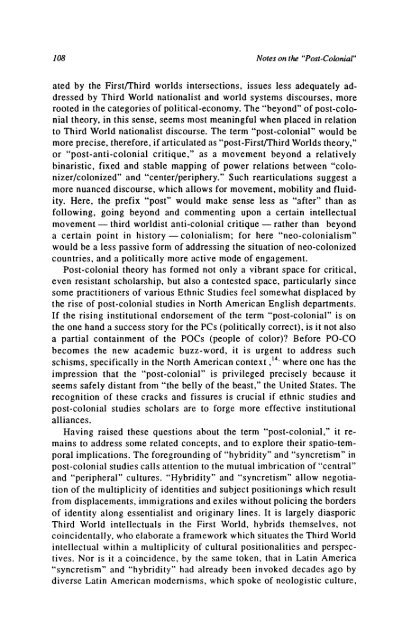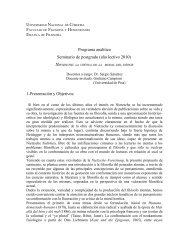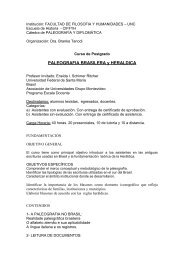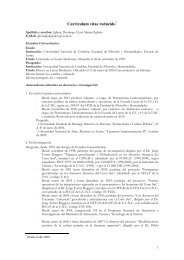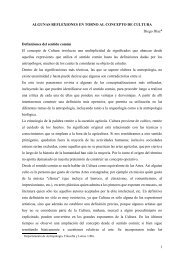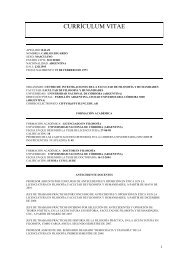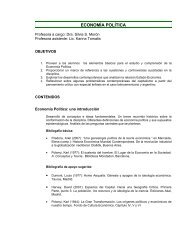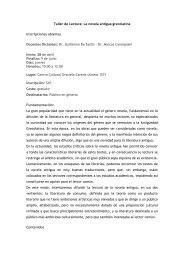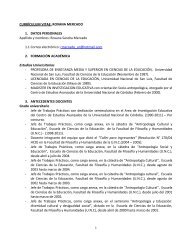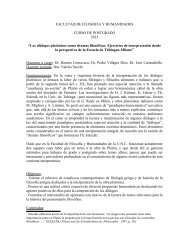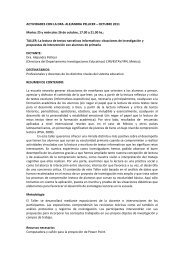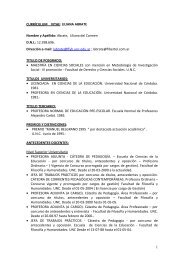Notes on the "Post-Colonial" Author(s): Ella Shohat Source: Social ...
Notes on the "Post-Colonial" Author(s): Ella Shohat Source: Social ...
Notes on the "Post-Colonial" Author(s): Ella Shohat Source: Social ...
Create successful ePaper yourself
Turn your PDF publications into a flip-book with our unique Google optimized e-Paper software.
108<str<strong>on</strong>g>Notes</str<strong>on</strong>g> <strong>on</strong> <strong>the</strong> "<strong>Post</strong>-Col<strong>on</strong>ial"ated by <strong>the</strong> First/Third worlds intersecti<strong>on</strong>s, issues less adequately addressedby Third World nati<strong>on</strong>alist and world systems discourses, morerooted in <strong>the</strong> categories of political-ec<strong>on</strong>omy. The "bey<strong>on</strong>d" of post-col<strong>on</strong>ial<strong>the</strong>ory, in this sense, seems most meaningful when placed in relati<strong>on</strong>to Third World nati<strong>on</strong>alist discourse. The term "post-col<strong>on</strong>ial" would bemore precise, <strong>the</strong>refore, if articulated as "post-First/Third Worlds <strong>the</strong>ory,"or "post-anti-col<strong>on</strong>ial critique," as a movement bey<strong>on</strong>d a relativelybinaristic, fixed and stable mapping of power relati<strong>on</strong>s between "col<strong>on</strong>izer/col<strong>on</strong>ized"and "center/periphery." Such rearticulati<strong>on</strong>s suggest amore nuanced discourse, which allows for movement, mobility and fluidity.Here, <strong>the</strong> prefix "post" would make sense less as "after" than asfollowing, going bey<strong>on</strong>d and commenting up<strong>on</strong> a certain intellectualmovement - third worldist anti-col<strong>on</strong>ial critique - ra<strong>the</strong>r than bey<strong>on</strong>da certain point in history -col<strong>on</strong>ialism; for here "neo-col<strong>on</strong>ialism"would be a less passive form of addressing <strong>the</strong> situati<strong>on</strong> of neo-col<strong>on</strong>izedcountries, and a politically more active mode of engagement.<strong>Post</strong>-col<strong>on</strong>ial <strong>the</strong>ory has formed not <strong>on</strong>ly a vibrant space for critical,even resistant scholarship, but also a c<strong>on</strong>tested space, particularly sincesome practiti<strong>on</strong>ers of various Ethnic Studies feel somewhat displaced by<strong>the</strong> rise of post-col<strong>on</strong>ial studies in North American English departments.If <strong>the</strong> rising instituti<strong>on</strong>al endorsement of <strong>the</strong> term "post-col<strong>on</strong>ial" is <strong>on</strong><strong>the</strong> <strong>on</strong>e hand a success story for <strong>the</strong> PCs (politically correct), is it not alsoa partial c<strong>on</strong>tainment of <strong>the</strong> POCs (people of color)? Before PO-CObecomes <strong>the</strong> new academic buzz-word, it is urgent to address suchschisms, specifically in <strong>the</strong> North American c<strong>on</strong>text ,14 where <strong>on</strong>e has <strong>the</strong>impressi<strong>on</strong> that <strong>the</strong> "post-col<strong>on</strong>ial" is privileged precisely because itseems safely distant from "<strong>the</strong> belly of <strong>the</strong> beast," <strong>the</strong> United States. Therecogniti<strong>on</strong> of <strong>the</strong>se cracks and fissures is crucial if ethnic studies andpost-col<strong>on</strong>ial studies scholars are to forge more effective instituti<strong>on</strong>alalliances.Having raised <strong>the</strong>se questi<strong>on</strong>s about <strong>the</strong> term "post-col<strong>on</strong>ial," it remainsto address some related c<strong>on</strong>cepts, and to explore <strong>the</strong>ir spatio-temporalimplicati<strong>on</strong>s. The foregrounding of "hybridity" and "syncretism" inpost-col<strong>on</strong>ial studies calls attenti<strong>on</strong> to <strong>the</strong> mutual imbricati<strong>on</strong> of"central"and "peripheral" cultures. "Hybridity" and "syncretism" allow negotiati<strong>on</strong>of <strong>the</strong> multiplicity of identities and subject positi<strong>on</strong>ings which resultfrom displacements, immigrati<strong>on</strong>s and exiles without policing <strong>the</strong> bordersof identity al<strong>on</strong>g essentialist and originary lines. It is largely diasporicThird World intellectuals in <strong>the</strong> First World, hybrids <strong>the</strong>mselves, notcoincidentally, who elaborate a framework which situates <strong>the</strong> Third Worldintellectual within a multiplicity of cultural positi<strong>on</strong>alities and perspectives.Nor is it a coincidence, by <strong>the</strong> same token, that in Latin America"syncretism" and "hybridity" had already been invoked decades ago bydiverse Latin American modernisms, which spoke of neologistic culture,


